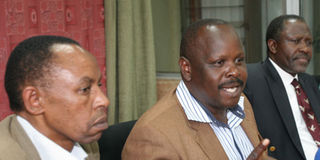House team faults IEBC vote zones report

Members of the Parliamentary Justice and Legal Affairs committee from left: Njoroge Baiya, Isaac Ruto and Mutava Musyimi. The Committee faulted the Independent Electoral and Boundaries Commission for ignoring the recommendations of Parliament regarding the new electoral zones March 8, 2012. FILE
The Justice and Legal Affairs Committee has faulted the Independent Electoral and Boundaries Commission for ignoring the recommendations of Parliament regarding the new electoral zones.
Speaking to journalists in Parliament the acting chairman of the committee Njoroge Baiya, said that while the IEBC was an independent arm of government, it was duty-bound to make sure that most of the proposals from MPs were taken on board.
“The impression we’re getting from their final report is that they did not even look at the proposals from Parliament,” said Mr Baiya (Githunguri).
However, Mr Baiya let the Commission off-the-hook saying that the House had not given it the option to increase the number of wards.
MPs, Mr Baiya said, capped the wards at 1,450 in the County Governments Bill, 2012 even before discussing the report of the Justice and Legal Affairs Committee that pushed for the creation of 60 new wards.
“That action sealed the scope for the IEBC. Because Parliament was double-tongued when it made its proposals,” he said.
He lamented that the IEBC could have fomented a barrage of litigation by taking the stance it had taken. With 500 petitions having been lodged with the House and the bulk of them ignored, Mr Baiya was almost categorical, that appeals in the Judiciary over the delimitation exercise were inevitable.
“Why did they do that? What was the point of them ignoring proposals that both sides on the ground were agreed upon? It defeats the whole purpose of consultation and using the delimitation exercise to bring peace to the country,” said Mr Baiya.
Chachu Ganya of North Horr, said he was “extremely unhappy” with the IEBC report and added that the only avenue left for him and his constituents was the court.
Ababu Namwamba (Budalang’i), however, backed the IEBC saying it had a statutory obligation to compile the final report taking on board recommendations from all players.
“You may have wished to receive an extra ward or an extra constituency, but the final say, under the law, rests with the IEBC. As a lawyer, I respect the work of the commission as an exercise of its statutory obligations,” said Mr Namwamba.
He said that though the IEBC Act prescribed that the commission had to prepare its final report “taking into account” the proposals from Parliament, it did not mean that the recommendations would all be taken on board.
“The report from Parliament was not just about the increase in the number of wards. It also dealt with tweaking of boundaries to take on board issues of community of interest. Some of these issues, I want to believe, were taken on board,” said Mr Namwamba.
The Budalang’i MP said that Parliament did not act in vain, because, its role was to give recommendations, which it did.




